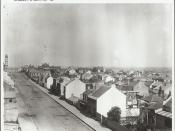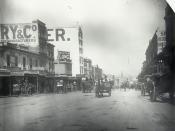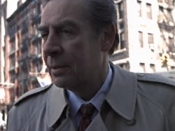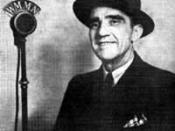In John Steinbeck's classic novel, Of Mice and Men, George, a small insensitive and short-tempered man, transforms from an ignorant and unfeeling individual into a more understanding and sympathetic person. At the opening of the novel, George's domineering and fiery personality lead to belittlement and verbal abuse towards Lennie, his mentally handicapped friend. As the story progresses, certain events and conflicts take place that initiate a change in George's personality. Later in the novel, indications through behavior and conversations reveal that George's metamorphosis from the old insensitive ways to his new more understanding personality have taken effect. These all exhibit one man's struggle to find himself and his true personality through his humble and meek handicapped friend.
In the beginning of the novel, George's visible verbal belittlement and abuse is his way of taking out his anger and frustration on his innocent friend, which is wrong and immoral.
George's fiery temper get in the way of his judgments and lead him to his heated confrontations with Lennie. While the two companions are camping out near the Salinas River, George uses his defenseless friend Lennie as a way to vent out his frustrations. When Lennie asks George for some ketchup George explodes at Lennie, "'Whatever we ain't got, that's what you want. God a'mighty, if I was alone I could live so easy. I could go get a job an' work, an no trouble"æAn' whatta I got,' George went on furiously. "ÃÂI got you! You can't keep a job and you lose me ever' job I get. Jus' keep me shovin' all over the country all the time. An' that ain't the worst. You get in trouble. You do bad things and I got to go get you out'" (12). George explodes on Lennie blaming him for all of his misfortunes and problems in his life. Lennie, being innocent and incapable of defending himself against the smarter George accepts the accusations and believes that he is to blame for all the problems in their lives. George's verbal bashing and ranting continue throughout the beginning of the novel. George never once takes into considerations Lennie's feelings but rather continues on with the humiliating and demoralizing comments. George still stared morosely at the fire. "'When I think of the swell time I could have without you, I go nuts. I never get no peace'" (13). Even though, Lennie is mentally handicapped George lacks the decency and common sense to withhold his vitriolic comments. Showing no regard for others feelings or emotions George has no trouble stepping all over his companion or crushing his self-esteem. Another instance of this ignorance and heartless behavior is George's temperament. George's domineering personality is another distinct characteristic that is noticeable in his actions and behaviors. "'You gonna get that wood?' George demanded. "ÃÂThere's plenty right up against the back of that sycamore. Floodwater wood. Now you get it'" (11). George's ignorance is evident through his tone of voice and demands directed toward Lennie. George's lacking of respect and mutual empathy between the two, implies that George thinks less of Lennie because he is handicapped. George's temperament, ignorance, and unkindness are all distinct characteristics that define the "old George" before his metamorphosis.
Later in the novel, the more noticeable indications that George is changing from his old insensitive ways are evident through his actions and speech. After Lennie and George finally land a job at a local farm, George comes across an old friendly man named Slim. While Slim questions George about his companion, Lennie, George openly confesses his wrongdoings toward Lennie. George grimly stated, "'I've beat the hell outa him, and he coulda bust every bone in my body jus' with his han's, but he never lifted a finger against me'" (44). As George listens to what he has just said about Lennie he begins to realize that his actions and ill-advised behaviors are not just and fair. George notices that no matter what pain or torment he inflicted upon Lennie, Lennie has always treated George with kindness, dignity, and respect. As George opens up further to Slim he begins to confess further acts of wrongdoing and ignorance. When Slim questions Lennie's loyalty towards George, George tells him his frightening experience first hand: "George's voice was taking on the tone of confession. "ÃÂTell you what made me stop that. One day a bunch of guys was standin' around up on the Sacramento River. I was feelin' pretty smart. I turns to Lennie and says, "ÃÂJump in.' An' he jumps. Couldn't swim a stroke. He damn near drowned before we could get him. An' he was so damn nice to me for pullin' him out. Clean forgot I told him to jump in. Well I ain't done nothing like that no more'" (44).
Lennie's loyalty towards George is unquestionable, however George realized that taking advantage of his loyalty will hurt their relationship and maybe one of the two physically. This is the first sign of regret that we notice from George that he expresses after he told Lennie to jump in the river and almost drowned. Furthermore, leading us to believe that this key event was a trigger toward his transformation. Another, instance of George's change in behavior is his sticking-up for Lennie. While working on the farm, Curley, a small, egotistical, overbearing man takes a disliking toward Lennie. Curley begins to pick a fight with the humble giant, "He slashed at Lennie with his left, and then smashed down his nose with a right. Lennie gave a cry of terror. Blood welled from his nose. "ÃÂGeorge,' he cried. "ÃÂMake "ÃÂum let me alone George.' He backed until he was against the wall, and Curley followed, slugging him in the face"æGeorge was on his feet yelling, "ÃÂGet him, Lennie. Don't let him do it'" (69). Never before had George once stood up for Lennie, but in this instance George all knowingly that his interference could land him and Lennie killed tells Lennie to retaliate and not take any more of a beating. Its significance is relevant because George finally wants Lennie to stand-up for himself and not accept any further abuse from whoever it may be. These significant events are the indication of George's transformation from his old self to the new caring and loving friend he really is.
The final stages of George's changes in his personality are revealed through his transparent emotions. Later in the novel, indications through behavior and conversations reveal that George's metamorphosis from the old insensitive ways to his new more understanding personality have taken effect. While talking with Slim George notices himself commenting on Lennie's vulnerability and harmlessness. "'Sure he's jes' like a kid. There ain't no more harm in him than a kid neither, except he's so strong'" (48). In the beginning of the novel George would never once use reasoning to explain Lennie's situation. George however understands that although Lennie is capable of mass destruction he is a unique individual with much to offer. George's outtake on Lennie has changed considerably and is now evident through his conversations with Slim. George explained, "'Course Lennie's a God damn nuisance most of the time,' said George. "ÃÂBut you get used to goin' around with a guy an' you can't get rid of him'" (45). This is the first apparent sign of George's transformation from his old ways. George never used to have any tolerance for Lennie or his actions. In fact George, blamed Lennie for all of their misfortunes and problems. However, all this has changed because George has learned to appreciate Lennie for the humble and loyal friend that he is. The last visible sign of George's alteration from his old habits are conspicuous through his speech. While the two are talking Lennie asks George if he is mad at him, "'No, Lennie. I ain't mad. I never been mad, an' I ain't now. That's a thing I want ya to know'" (116). Lennie's desire for approval from George is all he desperately yearns form his friend. George's transformation from the ignorant and unfeeling individual to the understanding and sympathetic person is clearly noticed. George no longer blames Lennie for any of their mishaps and adversity, leading one to the conclusion that George has completed his transformation.
In conclusion, George's domineering and fiery personality result in belittlement and verbal abuse towards Lennie, his mentally handicapped friend. As the story progresses, certain events and conflicts take place that initiate a change in George's personality. Later in the novel, indications through behavior and conversations reveal that George's metamorphosis from the old insensitive ways to his new more understanding personality have taken effect. George transforms from an ignorant and unfeeling individual into a more understanding and sympathetic person. These three stages help exhibit one man's struggle to find himself and his true personality through his humble and meek handicapped friend. In addition, these events lead "the new" George toward a difficult realization that the world is designed to prey on the weak.





